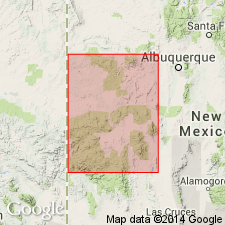
- Usage in publication:
-
- Moreno Hill Formation*
- Modifications:
-
- Named
- Dominant lithology:
-
- Sandstone
- Shale
- Coal
- AAPG geologic province:
-
- San Juan basin
Summary:
Named for Moreno Hill, T4N, R18W, Cibola Co, NM in San Juan basin. Section measured in N1/2 sec 7 designated the type section. The basal part is dusky-brown carbonaceous shale that overlies Atarque Sandstone (formation rank in Salt Lake coal field). Upper part is at top of pale yellowish-orange sandstone and shales beneath pinkish-gray gravel and sandstone of the Miocene Fence Lakes Formation. Is composed of orange to brown, very fine to very coarse grained, poorly sorted, subangular, cross-bedded sandstone, gray shale, carbonaceous shale, and olive-gray siltstone. Has thin coal beds. Is 519 ft (157 m) thick at type. Is 768 ft (233 m) thick to east. Is unfossiliferous. Considered to be middle to late Turonian or Late Cretaceous because it overlies the middle Turonian Atarque. Is of nonmarine fluviatile origin. Is equivalent in part to Tres Hermanos Formation, Pescado Tongue of Mancos Shale, and Gallup Sandstone. These rocks were assigned to Mesaverde Formation in earlier reports.
Source: GNU records (USGS DDS-6; Denver GNULEX).
For more information, please contact Nancy Stamm, Geologic Names Committee Secretary.
Asterisk (*) indicates published by U.S. Geological Survey authors.
"No current usage" (†) implies that a name has been abandoned or has fallen into disuse. Former usage and, if known, replacement name given in parentheses ( ).
Slash (/) indicates name conflicts with nomenclatural guidelines (CSN, 1933; ACSN, 1961, 1970; NACSN, 1983, 2005, 2021). May be explained within brackets ([ ]).

